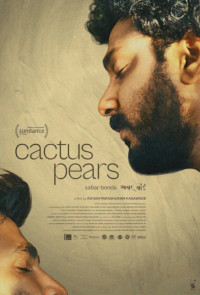| SHADOWS ON THE WALL | REVIEWS | NEWS | FESTIVAL | AWARDS | Q&A | ABOUT | TALKBACK | |||||||||||||||||||||||||||||
 Shadows off the beaten path Shadows off the beaten pathIndies, foreign, docs and shorts...
On this page:
CACTUS PEARS |
MOST PEOPLE DIE ON SUNDAYS |
MOTEL DESTINO
| |||||||||||||||||||||||||||||
| See also: SHADOWS FILM FESTIVAL | Last update 6.Jun.25 | |||||||||||||||||||||||||||||
|
Cactus Pears Sabar Bonda Review by Rich Cline |  MUST
MUST  SEE SEE
SUNDANCE FILM FEST SXSW LONDON Is it streaming?
| 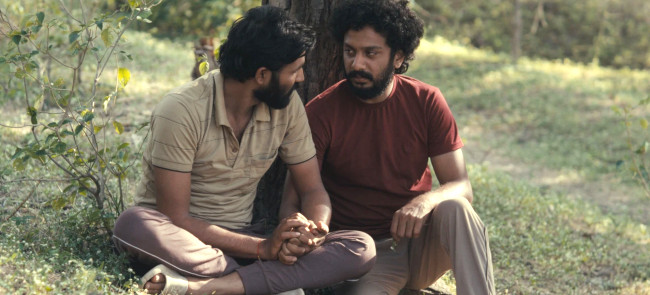 Hushed and observational, this beautifully shot Indian drama focuses on a 30-year-old gay man who has escaped his home culture but now is forced to make peace with it. Packed with local traditions and interpersonal details, the film is powerfully involving as writer-director Rohan Parashuram Kanawade continually finds unexpected layers of resonance. And in its skilfully low-key way, this exquisite film offers a strong sense of hope. After his father dies, Anand (Manoj) travels back to his home village, where he's expected to stay for 10 days of mourning. After living openly in Mumbai, he bristles at the rules he is expected to follow here. But he quietly accepts them. Then one day, he runs into his childhood friend Balya (Suman), who is also unmarried. As they reminisce and catch up, they rekindle the close connection between them, wondering if they could even imagine a future together. And everyone is shaken when Anand invites Balya to return to Mumbai with him. Everyone Anand meets asks him why he isn't married. He resists lying that he is waiting for the right girl, as his knowing mother (Jagtap) says. But both he and Balya are constantly set up with women they don't know, and they both understand how it feels to conceal their sexuality in order to survive. Craving his childhood treat, Anand learns that there are no cactus pear trees left in the village. But he discovers that there are other men like him. Manoj gives a delicately textured performance, as Anand grieves both his father's death and his inability to live his own life. The weight of hiding himself shows in his subtle expressions, which quietly brighten as he begins to feel like there might be hope after all. This makes the understated longing between him and Suman's more open-handed Balya unusually vivid. Their conversations are powerfully intimate even as they're constrained by circumstances. While everything about this film is subdued, including Vikas Urs' gorgeously artful cinematography, strong sparks of electric, uplifting emotions emerge in a gentle touch or incremental move. Anand had support from his late father, who was happy that he knew who he was. And now perhaps he can speak this openly with his mother too, as she encourages him to stop saying no to everything. Indeed, the only escape from emptiness is to start living as his true self. And where this story goes is lovely.
|
| Most People Die on Sundays Los Domingos Mueren Más Personas Review by Rich Cline | 
| 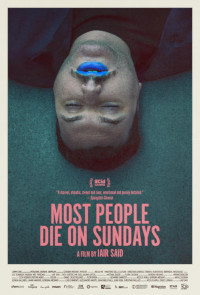 dir-scr Iair Said prd Nicolas Avruj, Diego Lerman with Iair Said, Rita Cortese, Juliana Gattas, Antonia Zegers, Lucas Bessaso, Nina Avruj Monteoliva, Homero Alegre Billoni, Mario Bodega, Gerardo Naumann, Francisco Bereny, Ceferino Carrera, Alejandro Valente release Arg 7.Nov.24, US 2.May.25 24/Argentina 1h13 Now streaming...
| 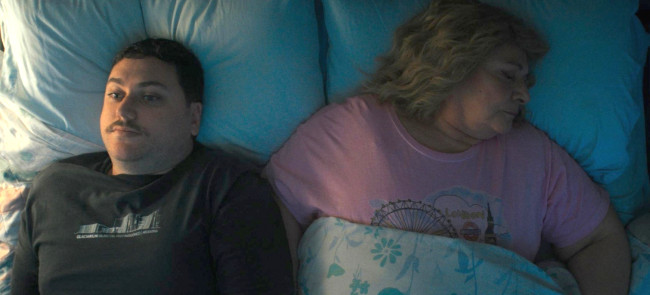 Despite the grim title, this Argentine drama has a gently comical tone, centred around a hulking teddy bear played by writer-director Iair Said, who seems to be oddly disconnected from everything in his life. This is a warm, humane little film in which not much happens, but the interaction reveals enjoyable angles to the characters. So even if the topic is death, the film resonates in unexpectedly life-affirming ways. Taking a break from studying in Europe, David (Said) returns to Buenos Aires for his uncle's funeral. Immediately, he's back in the middle of family business with his mother Dora (Cortese), sister Elisa (Gattas) and aunt Silvia (Zegers). Living with his mother, he begins trying to put his life back together. But he's lonely, looking for someone he can be himself with. Then he discovers that his mother thinks it's time to pull the plug on his comatose father (Bodega). And when a car crash lands him in hospital, he finally visits his dad. Little incidents pile up around David, such as when he tries to kiss his handsome driving instructor, which doesn't go well. And he also makes a move on his mother's hot neighbour. At a party, he kisses a boy with blue lipstick that won't come off. Almost everything he does backfires on him, but he takes these things in stride. And he begins to understand that his family is the support system he needs. Performances are relaxed and understated, creating realistic people who talk about everyday things, letting their feelings infuse their interaction. Each person has a deadpan, matter-of-fact charm that makes them very likeable. Said gives David a demeanour that's both playful and yearning. Even as he moves around listlessly, he accomplishes his various tasks. And his chemistry with Cortese's straight-talking Dora is beautifully played. Her journey through this narrative is less pronounced, and it's subtly moving. For David, his father's death is a pivotal milestone he's not ready to deal with, because he hasn't even started his own life yet. He's worried that he will never find someone who cares for him like his parents. These are thoughts that are easy to identify with, pulling the audience into David's perspective so that we root for him to feel less rootless. This is a lovely look at the need to keep moving forward in life, regardless of our age. And it's also a reminder of the healing power of drive-through fast food.
|
| Motel Destino Review by Rich Cline | 
| 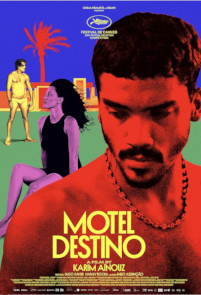 dir Karim Ainouz scr Wislan Esmeraldo prd Helene Theodoly, Gabrielle Tana, Michael Weber, Viola Fugen, Didar Domehri with Iago Xavier, Nataly Rocha, Fabio Assuncao, Renan Capivara, Fabiola Liper, Isabela Catao, Yuri Yamamoto, David Santos, Jupyra Carvalho, Bertrand de Courville, Jan Moreira, Edgle Lima release Br 22.Aug.24, US Apr.25 mff, UK 9.May.25 24/Brazil 1h55 CANNES FILM FEST Now streaming...
|  A bold spin on the femme fatale genre, this Brazilian dramatic thriller is stunningly shot by cinematographer Helene Louvert to flood scenes with primary colours, mainly reds and blues that sit gorgeously alongside the sunshiny seaside location. Director Karim Ainouz is terrific at finding the visceral power in a story, and these characters have such vivid internal lives that watching them circle around each other is riveting. In a small coastal town, 21-year-old Heraldo (Xavier) and brother Jorge (Capivara) work for local gangster Bambina (Liper), who insists that Heraldo finish one last job before he moves to Sao Paulo to find better work. But things take an unexpected twist, leaving Heraldo hiding in a sex motel, where the owners Dayana (Rocha) and her husband Elias (Assuncao) give him a job. But Heraldo is terrified that Bambina's goon Rafael (Santos) is going to find him. And the noisy activity in the hotel makes it difficult for Heraldo and Dayana to resist temptation. Emotions surge everywhere in this film, which takes Heraldo's perspective to show the flickering nightmares that don't allow him to feel peace. When asked what the problem is, he simply sighs, "I was born." Indeed, his entire life has been a series of tragedies, so he has no reason to expect that he'll get a happy ever after. Falling for his married boss is probably not the wisest move either. Xavier plays Heraldo with his heart on his sleeve, committing to the role with open-handed thoughts, feelings and full-on physicality. Rocha is also excellent as the life-loving Dayana, as is Assuncao as a happy-but-moody thug with wildly uncontrollable desires. The way these three characters get caught up together is complex, with surprising suggestions about deeper feelings. So when Dayana suggests to Heraldo that they should kill Elias, it's not clear if she's manipulating him, wishing or joking. The heightened drama swirling around them threatens to erupt into either outrageous sex or violence at any moment. Ainouz expertly maintains this tension, creating a wonderfully lurid sensibility that's both grippingly resonant and enjoyably excessive. And the presence of animals around the hotel, from a huge stray cobra to two randy donkeys, adds further texture as the story escalates. The film beautifully captures that nagging sense that there's something better for us out there, but perhaps we don't deserve it. The challenge is whether we have the nerve to take the leap.
| 
See also: SHADOWS FILM FESTIVAL © 2025 by Rich Cline, Shadows
on the Wall
HOME | REVIEWS | NEWS | FESTIVAL | AWARDS
| Q&A | ABOUT | TALKBACK | | ||||||||||||||||||
